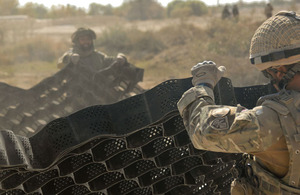British and Afghan operation sees villagers return
Families driven from three Helmand villages by Taliban activity are returning home after a successful operation by British soldiers and their Afghan allies.

A Royal Engineer and an Afghan man pull out a sheet of the cellular material that will form part of the foundations of the Route Trident extension in Helmand province, southern Afghanistan [Picture: Corporal Mark Webster, Crown Copyright/MOD 2010]
The operation, involving soldiers from The Royal Highland Fusiliers, 2nd Battalion The Royal Regiment of Scotland (2 SCOTS), and the 2nd Royal Tank Regiment, began with humble aims, but has now transformed the fortunes of hundreds of Afghan people.
In recent days, families have begun moving back to the settlements of Popalzai, Esserzai and Adamzai, villages or ‘kalays’ which had been all but abandoned because of insurgent activity and intimidation. Assisted by a British-funded tractor to transport themselves and their belongings, more families are returning every day, the shops in the area have re-opened, and community spirit is thriving.
Operation OQAB JORAWEL, which means “Eagle’s Build” in English, began in October 2010 with limited and specific objectives: to provide security to allow improvement and expansion work to take place on the construction of Route Trident. Under the operation, this key road linking the cities of Lashkar Gah and Gereshk - Helmand’s political and commercial hubs respectively - would be extended across the Loy Mandeh river.
The road and bridge works are now complete, providing the area with a new, modern highway, not only with a greater reach, but specifically designed to prevent the secretion of roadside bombs.
Determination, flexibility and ingenuity by the British troops and their Afghan partners tasked with this already challenging engineering role, saw other opportunities seized along the way; by the time the operation was drawn to a close at the end of last week, a large area of previously enemy-held terrain had been cleared, and dozens of insurgents killed or taken prisoner.
As well as the three abandoned villages close to Route Trident, the insurgent presence has been driven out or destroyed in nearby Khan Kheyl, Tabilla and Quelp East as well as along Route Ayrshire, once such an insurgent haven that it was known as ‘Taliban Road’. Across the area there has been a 90 per cent reduction in attacks and violent incidents.
The Operation has also seen a major expansion of the Afghan National Police’s presence in the area. Operation OQAB JORAWEL has not been at the cost of the transition of security responsibilities from British to Afghan forces; on the contrary, the two month period has seen that process accelerated, with five British checkpoints handed over to Afghan control, plus the construction of three new Afghan National Police checkpoints.
Initially, in the early ‘shaping’ phases of the operation, attacks increased as the insurgents realised the threat posed to their control by the increasing freedom of movement for Afghan people that the road improvements would bring. But British troops from The Royal Highland Fusiliers and the 2nd Royal Tank Regiment, along with their Afghan allies, stood firm in the face of the onslaught, causing such attrition amongst the insurgents that the number of attacks fell sharply within days.
A grouping of out-of-area fighters, thought to have migrated to the area in response to the operation, had little effect, with the majority of them neutralised by precision strikes and the remainder dispersing, not to be seen again.
An insurgent ‘sharpshooter team’ targeting the joint British and Afghan-run Checkpoint Inzargul was also identified. It is strongly believed that the team’s leader was killed or seriously injured in an exchange of fire, whilst one of his apprentices was subsequently taken out by an Apache helicopter strike. In the weeks leading up to the operation, there were up to three attacks a day on Checkpoint Inzargul; since 18 November 2010 there have been none.
Operation OQAB JORAWEL was conducted by Combined Force Lashkar Gah, a group of British and Afghan forces led by 2 SCOTS.
The Commanding Officer of 2 SCOTS, Lieutenant Colonel Dougie Graham, said:
Just over two months ago, this area was causing a rash of red on any briefing slide, with a steady spate of insurgent attacks. A few short weeks later, the area has seen a reduction of up to 90 per cent in daily attacks.
Op OQAB JORAWEL started with relatively limited aims but as we started to dominate the area, it became apparent that we had a significant opportunity to clear this difficult area of enemy-held terrain and, subsequently, allow local people within the area to move into protected communities.
Instrumental to this was the willingness of the Afghan National Security Forces in the area to lean into the risk and swiftly set up the new check points that ensured we could hold the ground we had taken.
Corporal James Thomson, an influence non-commissioned officer with 2 SCOTS, has been responsible for assisting families to move back to the secured areas. He said:
This whole initiative has been a massive success. The word of mouth will no doubt have spread about all the people moving back into an area that less than one month ago was deemed to be an insurgent haven.
The increase in population in the villages is meaning more workers, more shop owners, more people buying produce. There has been a marked increase in traffic on Route Ayrshire, and many more motorcycles carrying women and children on the back.
Another significant win has been the information we are now gathering from local people, which has produced some vital information, including the location of three improvised explosive devices.